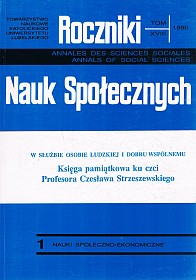The Ethics of the Nation
Abstract
The author proves that there are two contradictory opinions about the nation in Polish literature: the cosmopolitic and patriotic one. The first one expresses an ideology adopted by a man who claims that the nation is a „contractual” value to which one should keep an appropriate emotional and practical distance, and it can even be replaced by a more useful value. The second opinion sees in the nation an expression of the world of spirit. The nation here is thought to be a great social reality, a superindividual entity living its own life full of sublime values, which are indispensable for the supplement of the individual identity of a person.
In the author’s view the nation is a political, sociological, philosophical and ethical problem. What in fact is the nation? − he asks. The nation is the perennial subject of a collective life of mankind. It is the subject of weighty historical processes; it plays the role of a great sculptor who determines, to a considerable extent, the individual shape of particular individuals; it can preserve existence and create values without any external help from a social organization; it is a value, but not a „contractual” value, yet a living, creative and dynamic one. National culture is a basic social bond of the nation. It contains the following components: language, traditions, customs, fashions, common history and „self-awareness” of the nation. The author analyzes those elements in their union as particles of a superior whole, as an internally coherent category bearing a singular spiritual expression. The characteristics of national culture are as follows: „spontaneity”, „specificity” or else „indigenousness” of that culture. The author wants to render the principal idea more express, namely, that the nation creates culture, but also that it lives this culture. The task of the nation boils down to shape conditions for the spiritual development of a human being, hence it enters in the domain of morality. In view of that, the nation is entitled to the right to exist, to preserve its own identity, to cultural autonomy and to economic subjectivity. These rights imply many particular norms, directives and indications which compose the ethics of the nation. The duties of particular members towards the national fellowship are related to the rights of the nation.
The greatest threats to the foundations of a national being are the blows aimed at its culture. Thus it is an elementary duty of a national member to develop and disseminate national culture and to strengthen the bonds between the nation and religion. A member is obliged to affirm his own State and shape genuine democracy, to take a firm stand against threats to national culture which Card. S. Wyszyn´ ski sees in undermining the religious life of the nation by killing the unborn and demoralizing by mass culture.
There has arisen an ethical problem connected with the mass exodus of the young generation. It is also linked with the integral processes in Europe and the world. These processes bring some threat to national culture, yet one should expect that the imperatives of national ethos will die out. The author emphasizes that one should control those processes basing oneself on the moral principles. The awareness of threats should become a point of departure for a vivid activity on behalf of a continual renovation of the goods of national culture.
Copyright (c) 1990 Roczniki Nauk Społecznych

This work is licensed under a Creative Commons Attribution-NonCommercial-NoDerivatives 4.0 International License.


